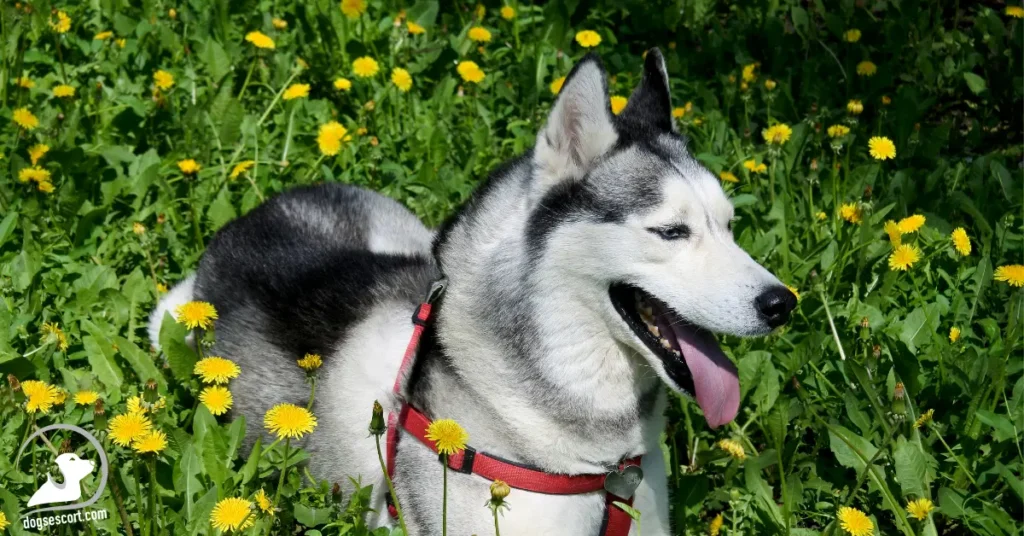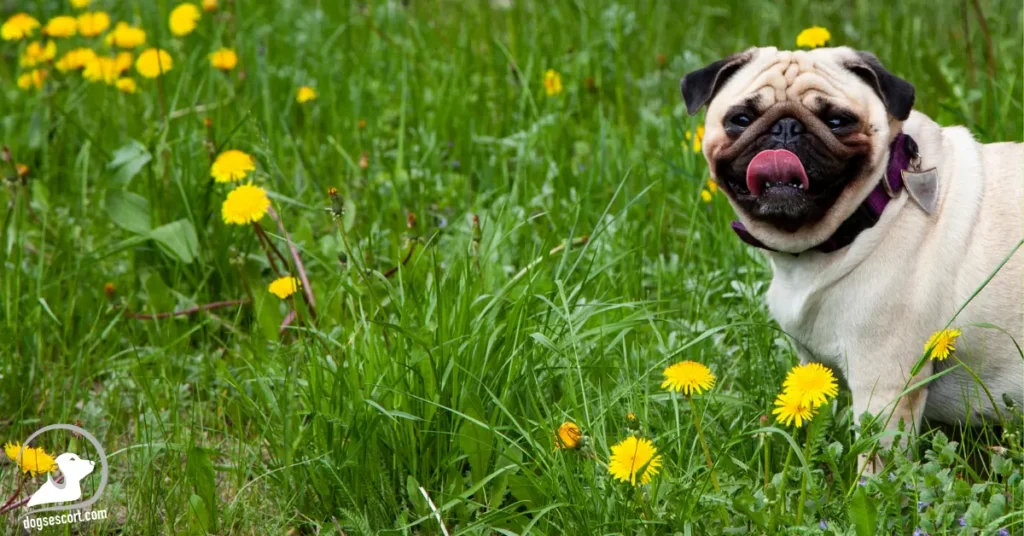Dandelions, those vibrant yellow flowers dotting lawns and fields, have long been associated with various health benefits for humans. But what about our furry friends? Many pet owners wonder whether dandelions can adversely affect their dogs, specifically if they can cause diarrhea. So, can dandelions give dogs diarrhea?
Dandelions are generally safe for dogs to consume in small amounts and are not known to cause diarrhea. However, excessive consumption of any unfamiliar plant or food item can upset a dog’s stomach and lead to digestive issues, including diarrhea.
Key Takeaways
-
Dogs can safely consume dandelions in moderation, providing various health benefits.
-
Dandelions are rich in essential vitamins such as A, C, and K and minerals like potassium, calcium, and iron.
-
When introducing dandelions to a dog’s diet, it is important to do so gradually and in controlled amounts.
-
Opt for organic dandelions or those not treated with pesticides or herbicides to ensure the dog’s safety.
Understanding Dandelions and Their Composition
Dandelions (Taraxacum officinale) are perennial plants commonly found in temperate regions. They are known for their bright yellow flowers and characteristic fluffy seed heads.
Rich in vitamins A, C, and K and minerals like potassium, calcium, and iron, dandelions have become beneficial plants for humans.
However, it’s essential to determine whether the same holds for our canine companions.
Can Dandelions Give Dogs Diarrhea?
Dandelions are not toxic to dogs, but overconsumption can lead to gastrointestinal upset, including diarrhea, because dandelions contain certain compounds that can act as natural laxatives and increase bowel movements.
Less amount in moderation, dandelions are generally safe for dogs and may even provide some health benefits.
If your dog has eaten many dandelions or shows signs of digestive upset like diarrhea, contact your vet for gentle advice.

Dandelions in a Canine’s Diet
Canines are known to have a more omnivorous diet compared to their feline counterparts, which raises questions about the suitability of dandelions in their diet.
While dogs primarily require a balanced diet that includes high-quality dog food, incorporating small amounts of fruits, vegetables, and herbs can be beneficial.
Dandelions, in moderation, can be safely introduced into your pooch’s diet as long as they are free from pesticides or harmful chemicals.
Benefits of Dandelions for Dogs
Dandelions offer several potential health benefits for dogs.
The vitamins and minerals present in these plants can support immune function, improve digestion, and promote healthy skin and coat.
Dandelions have diuretic properties, which can aid in detoxification and may benefit dogs with certain kidney or liver conditions.
However, as with any dietary change, it is crucial to introduce dandelions gradually and monitor your dog’s response.

Addressing the Diarrhea Concern
Can dandelions give dogs diarrhea? While some sources claim that dandelions can cause loose stools in canines, limited scientific evidence supports this.
Dandelions are unlikely to cause diarrhea in healthy dogs when consumed in moderation. However, as with any new food, individual sensitivities can vary, so observing your dog’s reaction when introducing dandelions into their diet is essential.
Factors That Influence Digestive Health
When evaluating the potential causes of diarrhea in canines, it’s crucial to consider other factors that may contribute to digestive upset.
Common culprits include sudden dietary changes, food allergies or intolerances, bacterial or viral infections, parasites, and certain medications.
Understanding these factors helps pet owners identify the root cause of diarrhea and seek appropriate veterinary care if necessary.
Safe Ways to Introduce Dandelions to Your Dog
If you’re interested in incorporating dandelions into your furry friend’s diet, it’s important to do so safely.
How to give dandelion to dogs?
-
Choose organic dandelions or ones not treated with pesticides or herbicides.
-
Start with small amounts of dandelions, gradually increasing the portion size over time.
-
Introduce dandelions to your dog’s diet to ensure a balanced nutritional intake.
-
Observe your dog for any adverse reactions, including diarrhea or changes in behavior.

You May Also Like To Read:
Other Uses of Dandelions for Canine Health
Apart from their potential dietary benefits, dandelions can also serve other purposes in promoting canine health. Here are a few additional ways in which dandelions can be utilized:
Dandelions have traditionally been used in herbal medicine to address various health issues in humans and animals. Some holistic veterinarians may recommend dandelion root or leaf extracts to support liver function, detoxification, or alleviate digestive disturbances.
Dandelion root and leaf extracts are available as nutritional supplements in capsules or tinctures. These supplements are believed to provide concentrated doses of beneficial compounds and can be used to complement a dog’s diet.
Dandelion-infused oils or salves can be used topically to soothe skin irritations or minor wounds in puppies. The natural anti-inflammatory properties of dandelions may help reduce itching and promote healing.
Dandelion root or leaf tea, when properly prepared and administered in moderation, may offer additional benefits to dogs. It can help with digestion, as a gentle diuretic, or as a hydrating beverage.
Precautions and Consultation with a Veterinarian
While dandelions are generally safe for dogs, it is important to exercise caution and consult a veterinarian before introducing any new food or supplement into your dog’s diet.
Certain pets may have underlying health conditions, sensitivities, or allergies that could interact with dandelions or other plants.
Professional guidance ensures the safety and well-being of your furry companion.
The Importance of a Balanced Diet
While dandelions can provide some nutritional benefits, it’s crucial to remember that they should not replace a balanced and complete dog food diet.
Commercial dog food formulas are specifically formulated to meet a dog’s nutritional requirements and provide a well-rounded source of essential nutrients.
FAQ
Can dogs eat dandelion puffs?
Dogs can eat dandelion puffs without any major health concerns. However, limiting their intake is best as consuming excessive amounts may lead to digestive upset.
Can dogs eat dandelion flowers?
Yes, dogs can eat dandelion flowers. They are generally safe for dogs and can be consumed in moderation. However, it’s always a good idea to consult a veterinarian before introducing new food into your dog’s diet.
Can dandelions make dogs sick?
In most cases, dandelions are not toxic to dogs and are unlikely to make them sick. However, individual dogs may have different sensitivities, so it’s important to monitor your dog for any adverse reactions and consult a veterinarian if you have concerns.
Does dandelion have a laxative effect?
The root of the dandelion plant has been known to have mild laxative properties and has been used to promote better digestion.
What are the symptoms of dandelion toxicity?
Dandelions are generally not toxic to dogs. However, if your dog consumes large quantities or has an allergic reaction, it may experience gastrointestinal upset, such as vomiting or diarrhea
Does dandelion cause gas?
Dandelions are not typically known to cause gas in dogs. However, every dog is unique, and some individuals may have sensitivities or reactions to specific foods.
My Final Thoughts
Can dandelions give dogs diarrhea? When introduced in moderation and with proper care, dandelions can be safely incorporated into a dog’s diet. They offer potential health benefits such as immune support, improved digestion, and skin health.
While claims that dandelions can cause diarrhea in dogs are not well substantiated, individual sensitivities may vary. As responsible pet owners, observing your dog’s response to any dietary change is always advisable, and consult with a veterinarian if concerns arise.
By considering your pet’s overall health and nutritional needs and seeking professional guidance, you can ensure the well-being of your beloved furry companion while exploring the potential benefits of dandelions.



